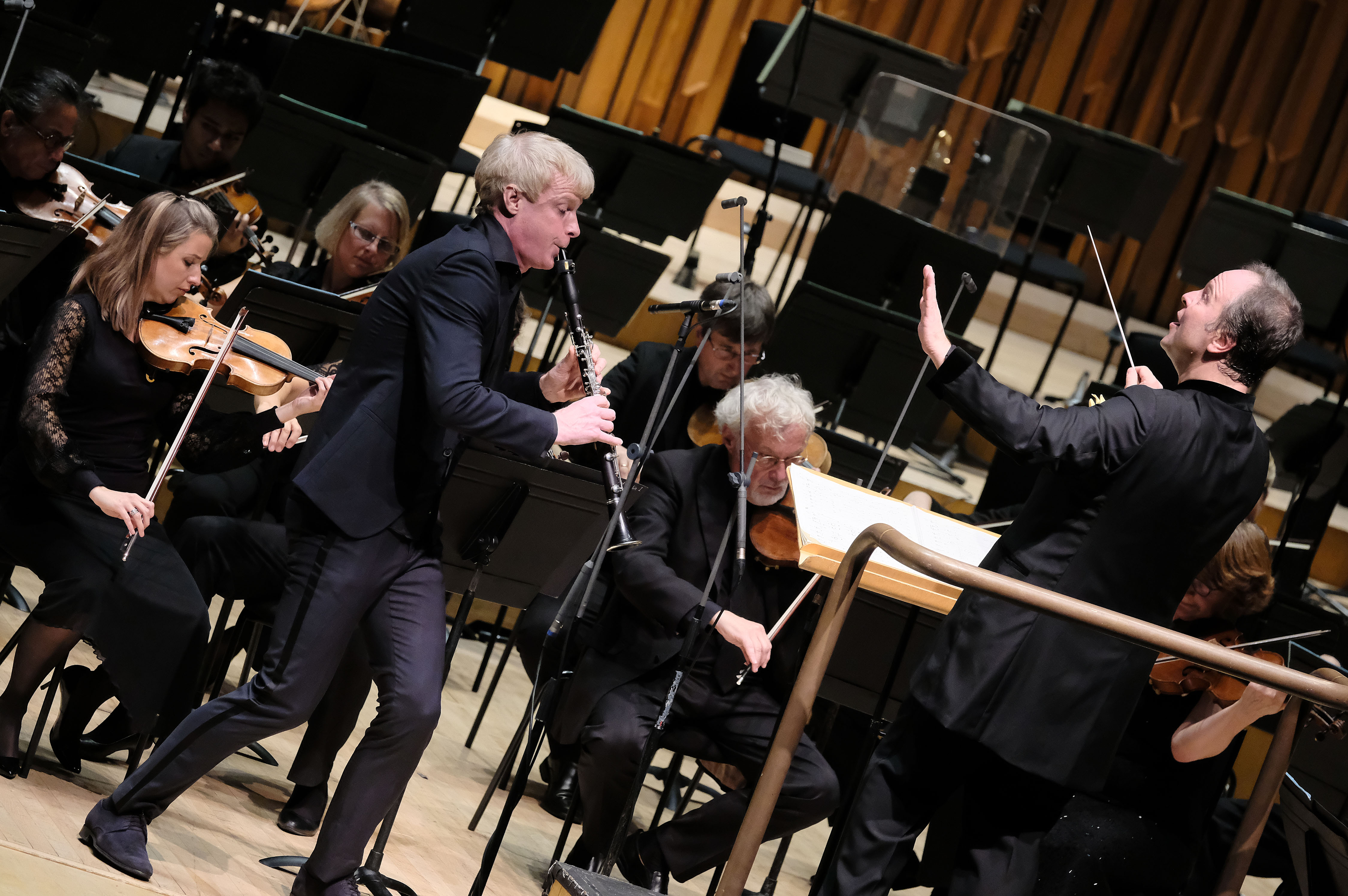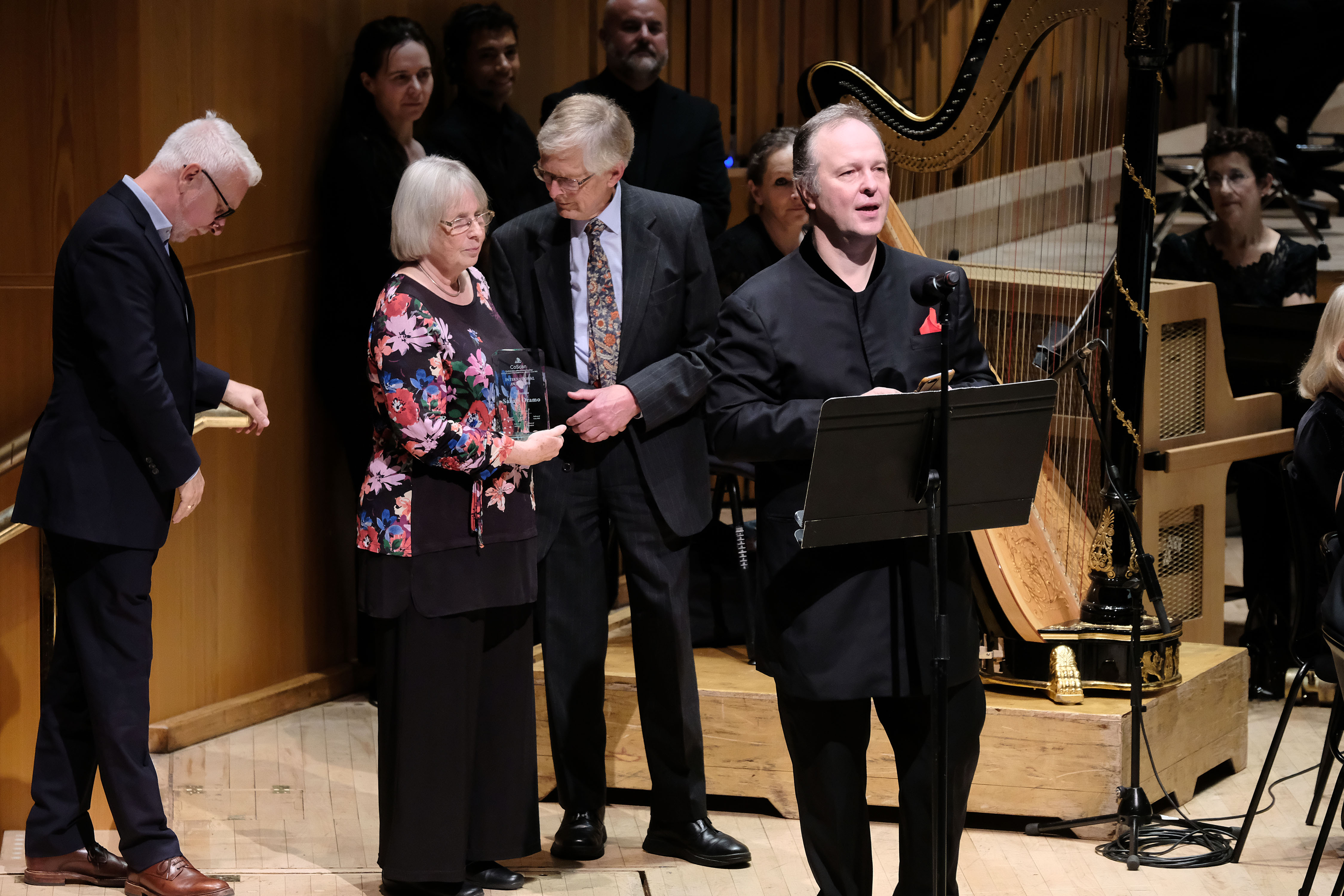Fröst, BBCSO, Oramo, Barbican review - blood, sweat and sweetness | reviews, news & interviews
Fröst, BBCSO, Oramo, Barbican review - blood, sweat and sweetness
Fröst, BBCSO, Oramo, Barbican review - blood, sweat and sweetness
Sheer heart attack in Prokofiev's Sixth Symphony crowns a rich and varied programme
Single adjectives by way of description always sell masterpieces short, and especially the ambiguous symphonies forged in blood, sweat and tears during the Stalin years.
High jinks first. The Appalachianesque sweetness which launches Copland's Clarinet Concerto, respite after the madcap dangers of the Shostakovich symphony, lasts just long enough not to cloy. Strings and harp brought it to rest in blue remembered hills before Fröst sprang the surprise - a restless cadenza ripping into an ever-changing dance finale. Jazz is part of the picture, as you'd expect from a work for Benny Goodman, reminding us that while Soviet Russia in 1947 still had horrors in store for Shostakovich, Prokofiev and millions of others, America was heading into a lively new world of stomping exuberance. Fröst's mobile partnership with his orchestral colleagues was just perfect, including swinging contributions from hyper-alert pianist Elizabeth Burley. 
After the interval, Oramo and his orchestra sailed for the deep waters only with a feral intensity in Prokofiev's most explicitly tragic symphony: still a work of immense daring in the postwar Soviet Union, soon to come under the cosh of Zhdanov's show trials against musical"formalism" in 1948. Jukka-Pekka Saraste, before conducting the BBCSO in the work some years back, said that he found the sadness almost unbearable. "Each of us has wounds that cannot be healed," Prokofiev wrote of the Sixth, referring to his own debilitating state of health following a hypertension attack and - less explicitly - the terror that was partly responsible for it. Arrhythmic heartbeats are heard throughout, along the lines of the ones in Mahler's Ninth Symphony (the comparison in terms of stature seems to me valid). The unhealing wound, moreover, is that of Amfortas in Wagner's Parsifal, as a quotation in the sandblasting Largo makes explicit. But there is the love music of Tristan here, too (direct rendering of the opening on the cellos). No other symphonic slow movement sounds anything like it, and with trumpeter Alan Thomas doubling the violin line to blistering effect, later extreme tenderness from horns in harmony, the effect was overwhelming.
Oramo also has his own sense of how radical changes in tempi can help the structure. In the second of Shostakovich's short but pregnant five movements, he moved on the strings' uneasy responses to the desolate clarinet solo to remind us that this is a flexible Valse Triste; subtler negotiations in the finale thrust its brassy distortion of a seemingly innocuous bassoon theme home before a dazzlingly articulate prestissimo. What a show, incidentally, from the entire wind department of the BBCSO; there surely isn't a better one to be found in any orchestra. In Prokofiev's first movement, the painful development can seem manufactured if too deliberate but here, whiplash after spaciousness for the tick-tocking lament that comes before it, it was simply horrifying. 
The future of Arts Journalism
You can stop theartsdesk.com closing!
We urgently need financing to survive. Our fundraising drive has thus far raised £49,000 but we need to reach £100,000 or we will be forced to close. Please contribute here: https://gofund.me/c3f6033d
And if you can forward this information to anyone who might assist, we’d be grateful.

Subscribe to theartsdesk.com
Thank you for continuing to read our work on theartsdesk.com. For unlimited access to every article in its entirety, including our archive of more than 15,000 pieces, we're asking for £5 per month or £40 per year. We feel it's a very good deal, and hope you do too.
To take a subscription now simply click here.
And if you're looking for that extra gift for a friend or family member, why not treat them to a theartsdesk.com gift subscription?
more Classical music
 Bizet in 150th anniversary year: rich and rare French offerings from Palazzetto Bru Zane
Specialists in French romantic music unveil a treasure trove both live and on disc
Bizet in 150th anniversary year: rich and rare French offerings from Palazzetto Bru Zane
Specialists in French romantic music unveil a treasure trove both live and on disc
 Scottish Chamber Orchestra, Ibragimova, Queen’s Hall, Edinburgh review - rarities, novelties and drumrolls
A pity the SCO didn't pick a better showcase for a shining guest artist
Scottish Chamber Orchestra, Ibragimova, Queen’s Hall, Edinburgh review - rarities, novelties and drumrolls
A pity the SCO didn't pick a better showcase for a shining guest artist
 Kilsby, Parkes, Sinfonia of London, Wilson, Barbican review - string things zing and sing in expert hands
British masterpieces for strings plus other-worldly tenor and horn - and a muscular rarity
Kilsby, Parkes, Sinfonia of London, Wilson, Barbican review - string things zing and sing in expert hands
British masterpieces for strings plus other-worldly tenor and horn - and a muscular rarity
 From Historical to Hip-Hop, Classically Black Music Festival, Kings Place review - a cluster of impressive stars for the future
From quasi-Mozartian elegance to the gritty humour of a kitchen inspection
From Historical to Hip-Hop, Classically Black Music Festival, Kings Place review - a cluster of impressive stars for the future
From quasi-Mozartian elegance to the gritty humour of a kitchen inspection
 Shibe, LSO, Adès, Barbican review - gaudy and glorious new music alongside serene Sibelius
Adès’s passion makes persuasive case for the music he loves, both new and old
Shibe, LSO, Adès, Barbican review - gaudy and glorious new music alongside serene Sibelius
Adès’s passion makes persuasive case for the music he loves, both new and old
 Anja Mittermüller, Richard Fu, Wigmore Hall review - a glorious hall debut
The Austrian mezzo shines - at the age of 22
Anja Mittermüller, Richard Fu, Wigmore Hall review - a glorious hall debut
The Austrian mezzo shines - at the age of 22
 First Person: clarinettist Oliver Pashley on the new horizons of The Hermes Experiment's latest album
Compositions by members of this unusual quartet feature for the first time
First Person: clarinettist Oliver Pashley on the new horizons of The Hermes Experiment's latest album
Compositions by members of this unusual quartet feature for the first time
 Gesualdo Passione, Les Arts Florissants, Amala Dior Company, Barbican review - inspired collaboration excavates the music's humanity
At times it was like watching an anarchic religious procession
Gesualdo Passione, Les Arts Florissants, Amala Dior Company, Barbican review - inspired collaboration excavates the music's humanity
At times it was like watching an anarchic religious procession
 Classical CDs: Camels, concrete and cabaret
An influential American composer's 90th birthday box, plus British piano concertos and a father-and-son duo
Classical CDs: Camels, concrete and cabaret
An influential American composer's 90th birthday box, plus British piano concertos and a father-and-son duo
 Cockerham, Manchester Camerata, Sheen, Martin Harris Centre, Manchester review - re-enacting the dawn of modernism
Two UK premieres added to three miniatures from a seminal event of January 1914
Cockerham, Manchester Camerata, Sheen, Martin Harris Centre, Manchester review - re-enacting the dawn of modernism
Two UK premieres added to three miniatures from a seminal event of January 1914
 Kempf, Brno Philharmonic, Davies, Bridgewater Hall, Manchester review - European tradition meets American jazz
Bouncing Czechs enjoy their Gershwin and Brubeck alongside Janáček and Dvořák
Kempf, Brno Philharmonic, Davies, Bridgewater Hall, Manchester review - European tradition meets American jazz
Bouncing Czechs enjoy their Gershwin and Brubeck alongside Janáček and Dvořák
 Solomon, OAE, Butt, QEH review - daft Biblical whitewashing with great choruses
Even a top soprano and mezzo can’t make this Handel paean wholly convincing
Solomon, OAE, Butt, QEH review - daft Biblical whitewashing with great choruses
Even a top soprano and mezzo can’t make this Handel paean wholly convincing
